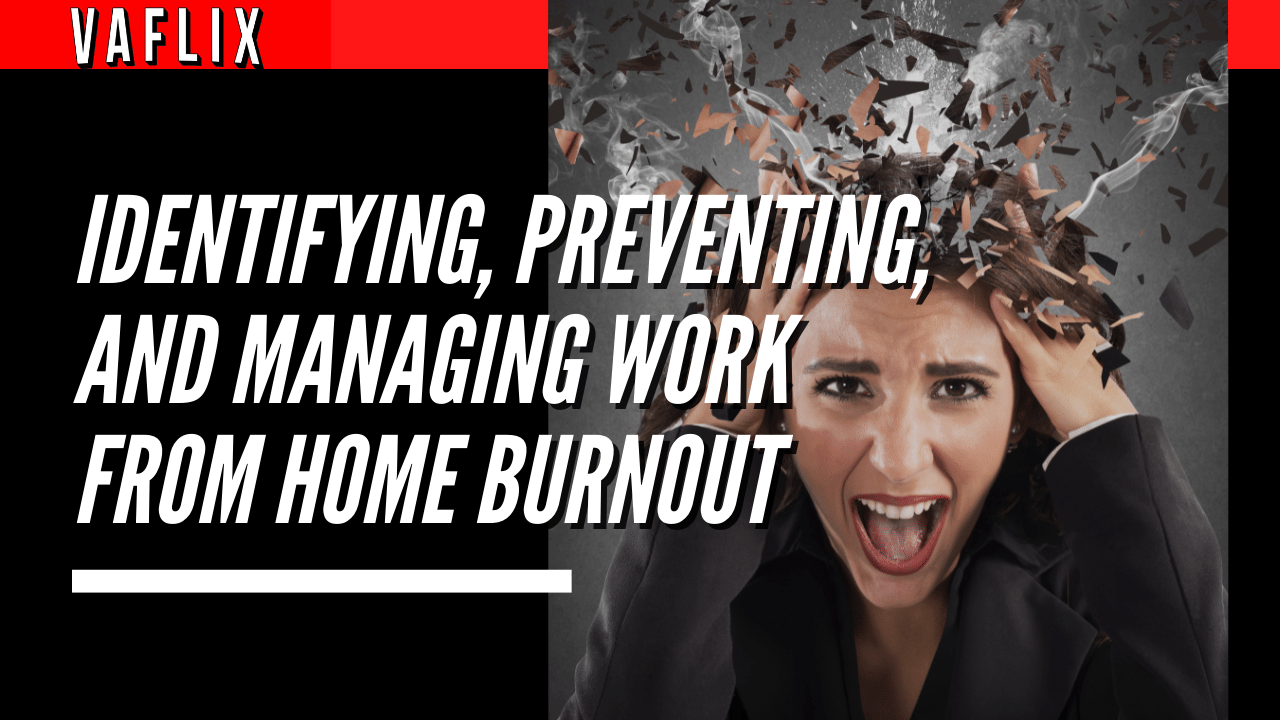Identifying, Preventing, and Managing Work From Home Burnout
Thinking of Hiring a Virtual Assistant?
Have you recently begun working from home? It is possible that the task may be more difficult than you imagined. The absence of physical cues that signal we are at a workplace, the absence of coworkers and management, the freedom of flexibility, the transitioning of an entire team or organization, the sharing of your workspace from home with your housemates, and the challenge of dealing with the uncertainty of a global pandemic are all factors to take into consideration. These are just some of the numerous new stresses that you could be experiencing for the first time in your life. It should come as absolutely no surprise that a good many of us are now experiencing the intense consequences of burnout at our places of employment.
Learn the signs of burnout, how to avoid it, and how to deal with it when working from home.
Identify the symptoms.
According to the World Health Organization’s definition, burnout is described as “a condition regarded as emerging from continuous occupational stress that has not been properly handled.” It is distinguished by the following three dimensions:
- feelings of energy depletion or exhaustion;
- increased mental distance from one’s job, or feelings of negativism or cynicism related to one’s job; and
- reduced professional efficacy.”
In its most basic form, burnout may be defined as the collection of feelings and behaviors that emerge as a direct consequence of being overworked and subjected to ongoing stress on the job. Burnout is becoming more common, which is understandable given the additional layer of stress, worry, and uncertainty that comes along with a worldwide epidemic. We are all fumbling along this unusual and steep learning curve that comes with having such a broad issue, so there is no need to be unhappy or harsh on yourself for not feeling like “you’re doing things right.” We are all experiencing feelings of loneliness, confusion, a sense of loss and sadness, and a sense of terror. There is no doubt that these genuine emotions that we are experiencing are having an effect on our job.
Not sure whether you’ve reached your limit or not? Please give yourself a moment to consider, and then answer the questions that follow.
- Do you feel as if your energy levels have been fully exhausted or that they are rapidly diminishing during the course of your work day?
- Do you have a pessimistic or cynical outlook on your place of employment, your fellow employees, or the company that you work for as a whole?
- Do you notice that the levels of productivity and production you achieve have decreased dramatically and regularly over time?
- When you try to finish your job, do you feel an overwhelming sensation of frustration or helplessness?
- Do you find yourself becoming more irritated than normal while dealing with work-related duties or coworkers?
- Do you have a sense of accomplishment, pride, or satisfaction when you finish a job or assignment at work, or are you having trouble recapturing the feeling of accomplishment that you used to have?
- How does your physical body feel? Are there any aches or pains that you are feeling that you normally wouldn’t classify as “ordinary” physical aches and pains?
Symptoms of burnout can vary greatly from person to person, and can manifest themselves both mentally and physically. So, be sure to check-in with yourself frequently and don’t ignore any signs. Keep track of your emotions and any physical feelings in your body that aren’t within your “norm,” and note these changes. The goal is to identify these symptoms as early on as possible and to implement prevention and management strategies to help keep burnout under control.
Prevention & management
Although there may not be a single, all-encompassing strategy for preventing and dealing with burnout, there are more than a few different approaches that you may try out in order to determine which one is most effective for you and the circumstances that you find yourself in.
Determine the nature of the issue at hand and investigate whether or not there is a workable answer. Even while we have no control over the current status of the epidemic, is it possible that we do have some influence over the other factors contributing to the burnout that we experience when working from home?
The following is a list of potential stresses that are within our control and some of the methods in which we may successfully deal with them:
- Office environment – How would you describe the setup of your home office? Is it isolated from the rest of the people who live in your house? Is it tidied up and well-organized? Have you made sure that you have all of the required materials and equipment that you need to finish the task that has to be done? Is it feasible to establish a location that is your own, with a limited number of interruptions, even if the circumstances in which people work from home will be different for everyone? Find a specific area in your house that may serve as a place of reflection and motivation so that you can get your job done. If at all possible, you should stay away from sections of the home that are busy or distracting for other family members (ex. the kitchen or living room).
- Stick to a schedule – When people work from home, they often discover that they end up working longer hours than they would in a conventional office setting. In spite of the fact that we are in a less stressful setting, there is a pervasive feeling that we have to make up for lost time by working longer hours. Due to the fact that they have nothing else to occupy their time, a lot of people are putting in far more hours of work each week than they typically would. It is in your best interest to have a schedule that is as close as feasible to the one you follow at your regular workplace. Give yourself some time in the morning before you go to work so that you may “get ready” for the day. Take regular breaks over the course of your workday, just like you would typically do while you’re at the workplace. Make sure to give yourself enough time for lunch as well as a “water cooler” talk with a member of your family or through video chat. It is not rude to step away from your work every so often to get some fresh air, stretch your legs, and clear your head. Give yourself a quick break from your job every few hours for a period of five to ten minutes. You don’t need to do something extravagant like switch on the television or anything like that.
- Regulate your sleep cycles – One further reason why maintaining a consistent work schedule is so essential is because of the impact it has on your typical pattern of sleeping. Your body craves a regular and predictable pattern of sleep. Consequently, if you are staying up later than you typically would and waking up much later, your body’s internal clock is probably not functioning properly. Your productivity and ability to operate at work might be negatively impacted if you are overtired or groggy. Maintaining a regular sleep schedule can help you feel more refreshed and keep your health in good standing.
- Exercise often and get outside. It is oppressive to be confined to our houses for an extended period of time. During the next few months of better weather, those of us who are fortunate enough to have access to an outdoor space will find that it is of great benefit to our mental health to spend time there. Having said that, if you want to improve your mental health, you do not need to have a garden or a balcony. You may give your body and mind a boost by doing things like going for a daily stroll outside in the fresh air, going for a jog, following a yoga session on YouTube, or lifting some weights (or weird, substitute items you find around the house). All of these are excellent methods to do so. In order to give yourself a vacation from the confines of your house during the summer months, you should make an effort to complete your workouts outdoors, if at all feasible.
- Communicate how you are feeling to your coworkers and to management – Inform your colleagues and management if you discover that something that used to operate in a virtual office environment no longer does so, if you come to the conclusion that it no longer does so. During the process of migrating to a remote work life, there will undoubtedly be a great deal of friction that your company will experience and may be attempting to iron out. If you have an idea that might enhance the functioning of a process or system that is already in place at your company, you should submit it to the right person or group and propose how the problem may be solved. Your suggestion, if it is carried out, will not only improve your circumstances but also those of other people who share your perspective.
Working from home has led to burnout for many of us, and we are starting to feel its crushing consequences. Be alert for the signs, and make sure to check up on yourself on a frequent basis. Find out what the primary cause of the issue is and evaluate if it is something that is within your control and something that you can resolve on your own.
Right now, practice patience and kindness toward yourself. No one of us is getting any of this right, especially at this early stage. We are all now going through a very steep learning curve, and it is going to take a significant amount of time before we can have a handle on everything. You shouldn’t be too hard on yourself since you haven’t been as productive as you usually are. Don’t be too hard on yourself if you feel that you can’t give an assignment or project your very best effort. time working from home amid this global health crisis, it is perfectly OK to not feel like yourself right now (or even for a while). In fact, it is encouraged. Reach out to other people and (at least virtually) surround yourself with individuals who will encourage you and give you the support you need. Keep yourself safe and well at all times, and don’t forget to look for yourself.



















